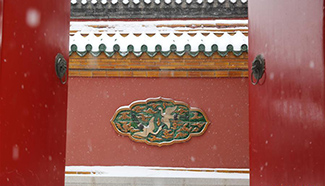SHANGHAI, Dec. 8 (Xinhua) -- Archeological findings in suburban Shanghai showed that China's business and shipping center was already a trade hub for the maritime Silk Road more than 1,000 years ago.
Chinese archeologists unearthed 6,000 restorable porcelain works and hundreds of thousands of porcelain pieces during an excavation from 2010 to 2016 at the ruins of Qinglong Town in the Qingpu District of Shanghai.
The porcelain products came from Fujian, Zhejiang, and Jiangxi provinces in south China, dating back to the Tang Dynasty (618-907) and the Song Dynasty (960-1279), said Chen Jie, director of the archeologist institute at Shanghai Museum.
"After comparison, we found the unearthed porcelain goods from Fujian at the Qinglong ruins were very similar to those discovered in the Korean Peninsula and Japan," said Chen, also head of the excavation team.
"This shows the porcelain was transported to Qinglong from south China kilns and then exported to the Korean Peninsula and Japan by sea," he added at a press conference on Thursday.
The unearthed chinaware also verifies historical documentary records, showing Qinglong Town was an important port for the maritime Silk Road, said Chu Xiaobo, deputy director of the Shanghai Bureau of Cultural Heritage.
The archeologists also unearthed the foundation of a Buddhist tower built between 1023 and 1032 at the ruins site. In a palace under the base, they found a mysterious case containing a statue of Sakyamuni, the founder of Buddhism. Numerous ancient coins were also found in the base.
The excavation at the ruins will continue. Shanghai plans to apply for top state heritage protection status for the site next year, according to the Shanghai Bureau of Cultural Heritage.










